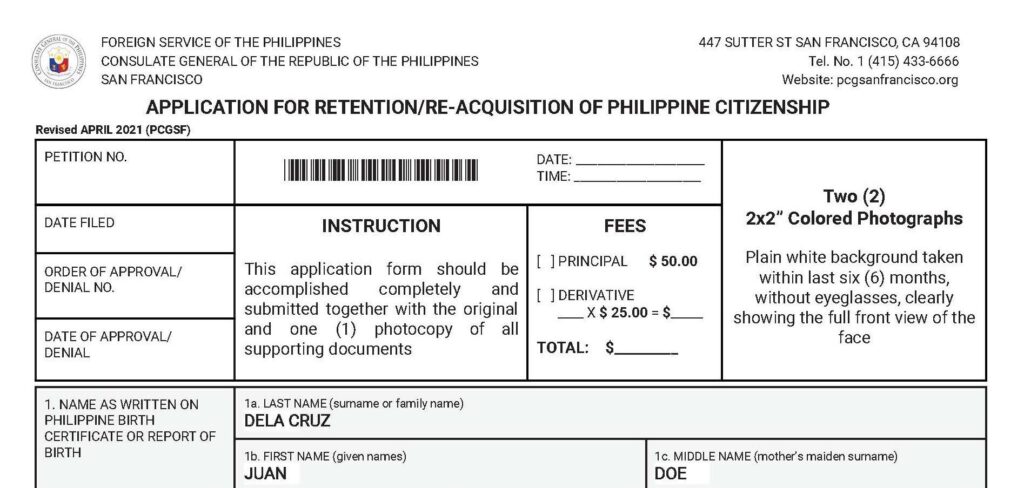DUAL CITIZENSHIP
General Information
Republic Act No. 9225, otherwise known as the Citizenship Retention and Re-acquisition Act of 2003 (more commonly known as the Dual Citizenship Law), declares that natural-born citizens of the Philippines who acquired foreign citizenship through naturalization may be eligible to reacquire or retain their Philippine citizenship.
Only natural-born citizens of the Philippines who have become citizens of another country by reason of naturalization may retain or re-acquire their Philippine citizenship under this Act. PLEASE NOTE THE FOLLOWING INFORMATION ON WHO IS CONSIDERED A NATURAL BORN-FILIPINO:
- LEGITIMATE CHILD BORN BEFORE 17 JANUARY 1973: The father was a Filipino citizen at the time of the child’s birth, as indicated in the PSA Birth Certificate. If the father is not Filipino, the child must have formally elected Filipino citizenship upon reaching the age of majority.
- ILLEGITIMATE CHILD BORN BEFORE 17 JANUARY 1973: The mother was a Filipino citizen at the time of the child’s birth, as indicated in the PSA Birth Certificate.
- CHILD BORN ON OR AFTER 17 JANUARY 1973: The father or mother was a Filipino citizen at the time of the child’s birth, as indicated in the PSA Birth Certificate.
Former natural-born Filipinos who have become naturalized citizens of another country can retain/reacquire their Philippine citizenship by taking an oath of allegiance to the Republic of the Philippines before a Philippine Consular Officer. Upon retaining/reacquiring their Philippine citizenship, they shall enjoy full civil, economic and political rights as Filipinos.
Under the principle of derivative citizenship, unmarried children below eighteen (18) years of age, whether legitimate, illegitimate, or adopted, of former Filipino parents who retained/reacquired their Philippine citizenship under this law, may also be deemed Filipino citizens, if they are included in the parent’s application for retention/reacquisition of Philippine citizenship.
Application for Dual Citizenship is made in person and by appointment only. The Consulate does not accept mailed-in applications.
IMPORTANT: Persons who fall under the following conditions are considered Dual Citizens at Birth and need not apply for dual citizenship under R.A. 9225 –
- A child born in the United States on or after 17 January 1973 when either or both parent/s was still a Filipino citizen is considered to be a dual citizen at birth. Such children should have their births reported to the Philippine Embassy/Consulate General having jurisdiction over the place of birth or to the nearest Philippine Embassy/Consulate General in their area of current residence, to be reported as a Filipino citizen. Please see requirements for Report of Birth.
- A child born in the Philippines on or after 17 January 1973 with an American parent and a Filipino parent and who was issued a Consular Report of Birth by the U.S. Embassy in Manila is considered to be a dual citizen at birth. He or she may apply for a Philippine passport upon presentation of complete requirements.
Procedure and Requirements
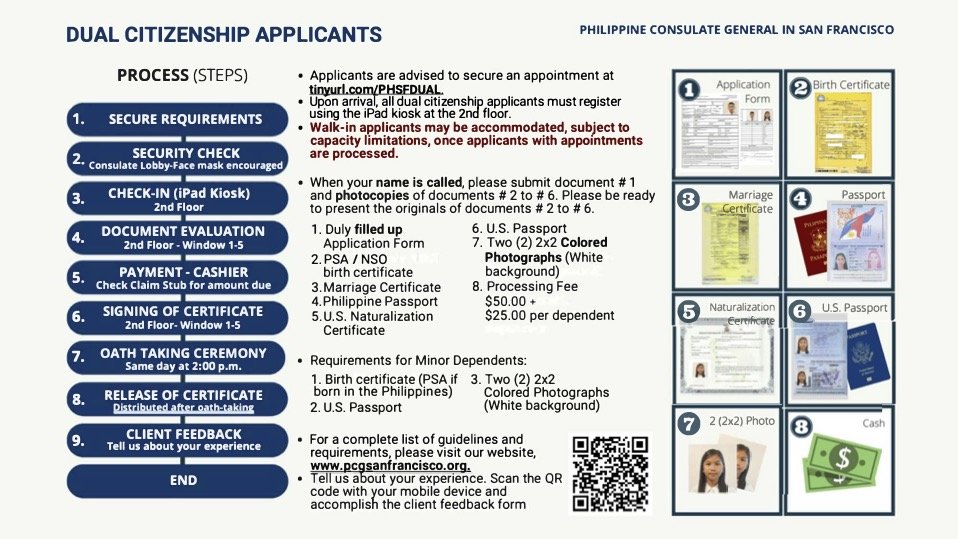
How to Apply
A. FOR THE PRINCIPAL (18 years old and above)
Accomplish the Online Dual Citizenship Application Form. (NOTE: there is no need to notarize the form).
How to Accomplish
- This Online Dual Citizenship Application Form Generator is free.
- Make sure that all information provided are accurate and true to the best of your knowledge.
- Upon completion of this Form Generator, you shall receive an e-mail of your Dual Citizenship application form. Check the inbox or spam folders in your email. Make sure you have Adobe Acrobat Reader installed in your computer.
- Print the completed form and bring this together with your supporting documents and other requirements on your appointment date.
- Applicants are also reminded that the email account used for the application form must be valid, active and accessible as the generated dual citizenship application form will be sent to that email account.
- By using the system, you authorize the Philippine Consulate General in San Francisco to collect, store and process your data strictly for the purpose of dual citizenship record creation and issuance. Information contained in this Form Generator shall be protected under the Philippine Data Privacy Act.
Present the original and submit one (1) photocopy of the Birth Certificate (BC) issued by the Philippine Statistics Authority (PSA), formerly National Statistics Office (NSO). To request a certified copy of the birth certificate from PSA, please click here. To view a sample PSA-issued BC, click here. A former natural-born citizen, who was born abroad, shall present a copy of the Report of Birth issued by the Philippine Embassy or Consulate and, in applicable cases, the original of the Birth Certificate by competent foreign authorities.
An Affidavit of Explanation must be provided if the name in the PSA/NSO Birth Certificate differs from the name being used by the applicant in other documents.
Present the original and submit one (1) photocopy of the U.S./Foreign Certificate of Naturalization.
Present all the originals and submit one (1) photocopy of each of the following supporting documents, if applicable:
a. Philippine passport
b. U.S. Passport
c. If married in the Philippines – Marriage Certificate (MC) issued by the Philippine Statistics Authority (PSA) formerly National Statistics Office (NSO). To request a certified copy of the marriage certificate from PSA, please click here.
d. If married in the U.S. or in other countries – Marriage Certificate/s duly issued by the City/County where the marriage was celebrated or Country (if married outside the US) and Divorce Decree if divorced, Marriage and Death Certificate of Spouse if widow/widower.
e. Philippine voter’s affidavit or voter’s identification card, if available.
f. Such other Philippine Government-issued documents that would show that the applicant is a former natural-born citizen of the Philippines as may be acceptable to the evaluating officer.
g. If the applicant is a Bureau of Immigration (BI) Registered Alien – please submit the original ACR and ICR/CRTV, or in its absence, an Affidavit explaining the loss of said documents.
To avoid processing delays, be sure your photo meets all the following photo requirements:
- Two (2) identical 2×2″ colored photographs.
- Taken in plain white background and within the last six (6) months.
- Without eyeglasses.
- Clearly showing the full front view of the face.
- Blurred or low-quality photos are not accepted.
Attach or paste one (1) photograph to your application form (Page 1) and prepare one (1) for your certification.
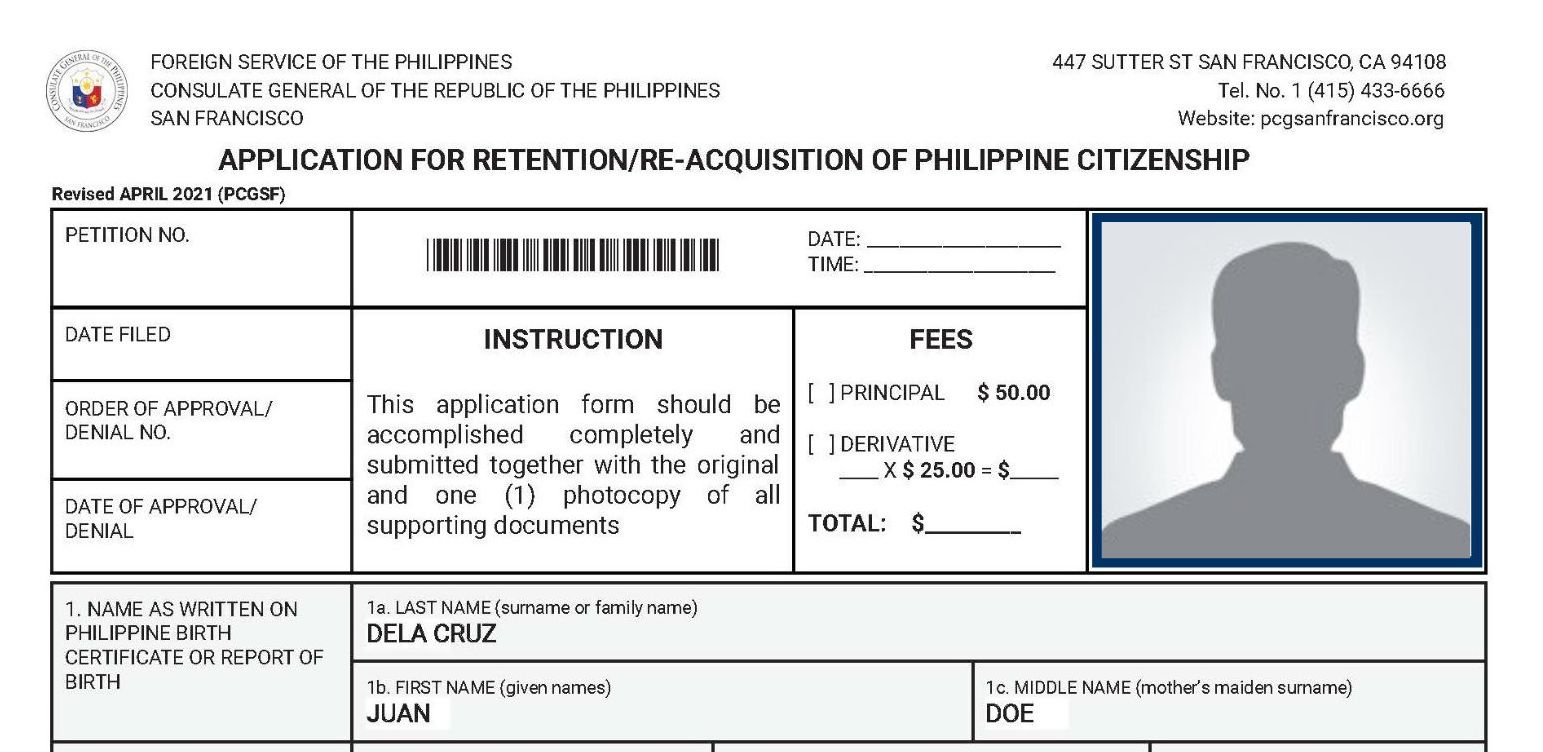
All Fees are non-refundable. Fees should be made in cash, credit/debit card (with a convenience fee) or made payable to the “Philippine Consulate General” in Money Order, Bank Draft, Certified Check or Cashier’s Check.
Dual (Principal) … $ 50.00
Dual (Minor Derivative) … $ 25.00
Personal checks are not accepted.
At the time of your application, you must review your personal details, affix your signature, and affix your thumbmarks on the spaces provided for on the certificate.
You will get all processed documents (Identification Certificate, Oath of Allegiance, and Order of Approval) once you have taken your oath. Upon receipt of your documents, please examine them if they were duly signed by the Consular Officer. The documents are invalid if not signed.
All approved/completed applications and supporting documents, including oath of allegiance, order of approval, ACR and ICR/CRTV, if any, are forwarded to the Bureau of Immigration (BI) in the Philippines.
Civil Registry Services provided by the Philippine Statistics Authority:
Certified copies of Birth, Marriage, and Death Certificates, and Certificate of No Marriage Record (CENOMAR), can be requested online at PSA Serbilis (https://www.psaserbilis.com.ph). PSA will mail your request/record to your U.S. address via courier service.
For Inquiries: Please send an email to [email protected]
- Go to https://pcgsanfrancisco.as.me/dual. See the guide below:

How to Apply
B. FOR THE PRINCIPAL'S MINOR DERIVATIVE (below 18 years old)
For each of the principal’s unmarried children below eighteen (18) years of age, the following must be submitted and included in the parent’s application for retention/reacquisition of Philippine citizenship:
Present all the originals and submit one (1) photocopy of each of the following:
a. Minor child’s Birth Certificate (PSA copy if born in the Philippines)
b. U.S./Foreign Certificate of Naturalization
c. Philippine and/or U.S. Passport
The Philippine Consulate General reserves the right to require additional proof or documents from an applicant, to determine his/her citizenship/identity, the authenticity of the documents submitted, and to ensure accurate and complete personal data entries, pursuant to the Philippine Passport Law (R.A. 8239) and the Foreign Service Act (R.A. 7157).
To avoid processing delays, be sure your photo meets all the following photo requirements:
- Two (2) identical 2×2″ colored photographs.
- Taken in plain white background and within the last six (6) months.
- Without eyeglasses.
- Clearly showing the full front view of the face.
- Blurred or low-quality photos are not accepted.
Attach or paste one (1) photograph to your application form (Page 2) and prepare one (1) for your certification.
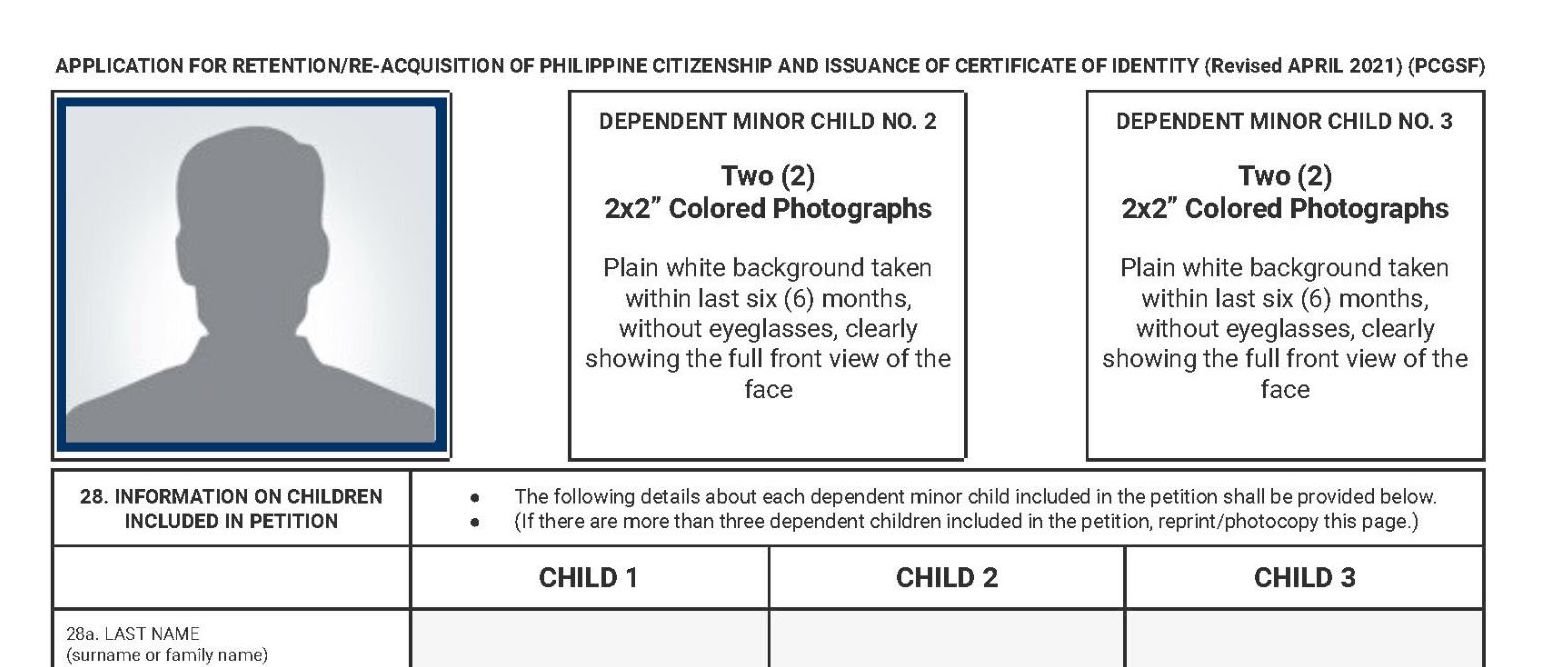
All Fees are non-refundable. Fees should be made in cash, credit/debit card (with a 4% convenience fee) or made payable to the “Philippine Consulate General” in Money Order, Bank Draft, Certified Check or Cashier’s Check.
Dual (Principal) … $ 50.00
Dual (Minor Derivative) … $ 25.00
Personal checks are not accepted.
At the time of your application, you must review your personal details, affix your signature, and affix your thumbmarks on the spaces provided for on the certificate.
You will get all processed documents (Identification Certificate, Oath of Allegiance, and Order of Approval) when the principal petitioner has taken the oath. Upon receipt of your documents, please examine them if they were duly signed by the Consular Officer. The documents are invalid if not signed.
Civil Registry Services provided by the Philippine Statistics Authority:
Certified copies of Birth, Marriage, and Death Certificates, and Certificate of No Marriage Record (CENOMAR), can be requested online at PSA Serbilis (https://www.psaserbilis.com.ph). PSA will mail your request/record to your U.S. address via courier service.
For Inquiries: Please send an email to [email protected]
How to Apply
C. MINOR DEPENDENTS WHO WERE NOT INITIALLY INCLUDED FOR DERIVATIVE DUAL CITIZENSHIP
If the principal applicant already applied for dual citizenship and failed to include dependent children in the application, s/he may file a petition for inclusion of dependent children who are under 18 years of age and unmarried.
Requirements:
- Duly accomplished Petition for Inclusion of Dependents Application Form.To download the the form click here.
- One (1) Original and one (1) photocopy of Petitioner’s Dual Citizenship papers (Oath of Allegiance, Identification Certificate, & Approval Order)
- Two (2) pieces of dependent child’s 2″ x 2″ (passport size) photograph with white background taken not more than 3 months before the date of application.
- Two (2) pieces of principal’s 2x 2 (passport size) photograph with white background taken not more than 3 months before the date of application.
- Original and one (1) photocopy of dependent child’s birth certificate.
- Original and one (1) photocopy of dependent child’s valid foreign passport bio-page.
- One (1) photocopy of the child’s Philippine passport bio-page (for those born in the Philippines) and have the original passport ready for vetting.
- One (1) photocopy of petitioner’s valid passport bio-page and have the original passport ready for vetting.
- Payment: $25.00 for each dependent – Payment should be in the form of cash, credit card, money order or cashier’s check payable to the Philippine Consulate General. Personal checks are not acceptable.
The Consular Officer reserves the right to require additional documents from the informant or applicant when necessary.
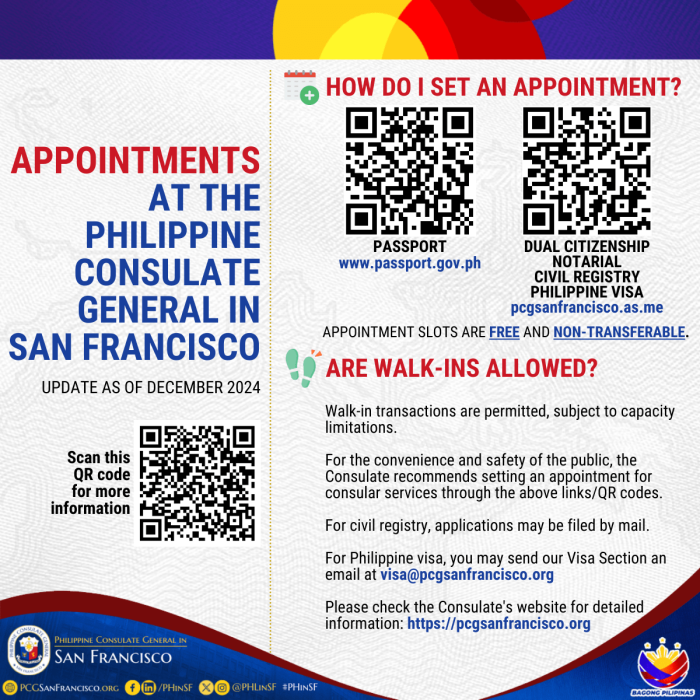
Frequently Asked Questions (FAQs) on Dual Citizenship
Answer:
Natural-born Filipino citizens are those who are citizens of the Philippines from birth without having to perform any act to acquire or perfect their Philippine citizenship. The following are considered natural-born Filipino citizens:
- LEGITIMATE CHILD BORN BEFORE 17 JANUARY 1973: The father was a Filipino citizen at the time of the child’s birth, as indicated in the PSA Birth Certificate. If the father is not Filipino, the child must have formally elected Filipino citizenship upon reaching the age of majority.
- ILLEGITIMATE CHILD BORN BEFORE 17 JANUARY 1973: The mother was a Filipino citizen at the time of the child’s birth, as indicated in the PSA Birth Certificate.
- CHILD BORN ON OR AFTER 17 JANUARY 1973: The father or mother was a Filipino citizen at the time of the child’s birth, as indicated in the PSA Birth Certificate.
Answer:
Natural-born Filipino citizens are those who are citizens of the Philippines from birth without having to perform any act to acquire or perfect their Philippine citizenship. The following are considered natural-born Filipino citizens:
- LEGITIMATE CHILD BORN BEFORE 17 JANUARY 1973: The father was a Filipino citizen at the time of the child’s birth, as indicated in the PSA Birth Certificate. If the father is not Filipino, the child must have formally elected Filipino citizenship upon reaching the age of majority.
- ILLEGITIMATE CHILD BORN BEFORE 17 JANUARY 1973: The mother was a Filipino citizen at the time of the child’s birth, as indicated in the PSA Birth Certificate.
- CHILD BORN ON OR AFTER 17 JANUARY 1973: The father or mother was a Filipino citizen at the time of the child’s birth, as indicated in the PSA Birth Certificate.
Answer:
Applicant shall submit his/her Birth Certificate (original and photocopy) issued by the Philippine Statistics Authority (PSA), formerly National Statistics Office (NSO). If you do not have a copy of your birth certificate, you may request a certified copy online through their website: (https://www.psaserbilis.com.
Answer:
Answer:
Prospective applicants for dual citizenship under R.A. 9225 are advised to visit and read the contents of the website of the U.S. Department of State which contains information about current U.S. government policy on dual nationality, or to seek legal advice from a U.S. immigration lawyer.
Answer:
You should obtain a Certification from the US Citizenship and Immigration Services (USCIS) indicating the details of your naturalization, including the date of naturalization and Certificate number. You may e-mail [email protected] regarding this or visit the following website: https://www.uscis.gov/n-565
Answer:
The Consular Officer will administer the Oath of the applicants at 2:00 p.m. on the same date of application.
Answer:
The ceremony is a solemn and meaningful event. Please dress in a proper attire to respect the dignity of the event.
Answer:
Applicant may a) execute an Affidavit (click here to download form) explaining the discrepancy, and b) present original and submit photocopy/copies of at least two (2) public or private documents showing the correct name of the applicant. This Affidavit has to be notarized.
Answer:
No, you can no longer use your valid Philippine passport and the same will be cancelled physically by the Consular Officer. Applicants are asked to surrender their existing Philippine passports (if still valid) and are advised to apply for a new one only after taking their Oath as a dual citizen and not earlier. The latest Philippine passport has been rendered null and void the moment you were naturalized as a U.S. citizen.
Answer:
The application for a Philippine passport is a separate transaction. Applicants remain ineligible to apply for a new passport until they have taken their oath.
Answer:
Application for a Philippine passport is optional and not mandatory. It should be noted that the Identification Certificate issued by the Philippine Embassy/Consulate General is considered sufficient proof of Philippine citizenship for those persons entering or leaving the Philippines holding foreign passports. Applicants may also apply for a Philippine passport, which is considered a universally recognized government issued identification document (ID).
Answer:
Persons who wish to declare their dual citizenship are advised to present their foreign passport as well as their valid Philippine passport and/or Identification Certificate upon entering and departing the Philippines.
Answer:
An immigrant visa may be issued to a Filipino citizen’s foreign spouse that entitles him/her to permanently reside in the Philippines. Said visa may be obtained by applying at the Philippine Embassy/Consulate General and with the Philippine Bureau of Immigration. The validity of the visa, however, is contingent upon the Filipino citizenship of his/her spouse.
Answer:
Under the Balikbayan Program, a Filipino citizen’s foreign spouse and children traveling to the Philippines do not need to secure other travel documents because they are entitled to a visa-free entry to the Philippines for a period of one (1) year, among other privileges provided they travel together with the former Filipino spouse or parent. Otherwise, if the foreign spouse or child is a visa-required national, he or she would need to apply for an appropriate visa.
Please note that at this time of pandemic, the Balikbayan Program may be suspended. As such, the foreign spouse or child may need to apply for an entry visa. For inquiries, please send an email to [email protected].
Answer:
Residency in the Philippines is not a requirement for those who reacquired/retained their Philippine citizenship. Those who intend to vote in local elections, however, must establish residence in the locality where they wish to vote.
Answer:
You can now reside in the Philippines indefinitely and for as long as you want without having to apply for a Philippine visa and pay immigration fees. You can even choose to retire or permanently reside in the Philippines, provided you show proof of your Dual Citizenship (e,g, Identification Certificate) together with your U.S. passport upon arrival and departure in the Philippines.
Answer:
You will enjoy all full civil, economic and political rights enjoyed by Filipino citizens. Among them are:
1. Travel using a Philippine passport
2. Ownership of real property in the Philippines {subject to limitations provided by law)
3. Engage in business, trade and commercial activities
4. Practice one’s profession, in accordance with existing Philippine Laws; A person who has reacquired Philippine citizenship may be able to practice his/her profession in the Philippines, provided that he/she applies with the Professional Regulation Commission (PRC), the Supreme Court for Lawyers, and other applicable Philippine agencies or bodies for a license or permit to engage in such professional practice. Those appointed to a public office shall make a sworn renunciation of the oath of allegiance to the country where they took their oath.
5. Exercise of right to vote or suffrage during Philippine elections and that the individual must comply with the residency requirement under existing Philippine election laws. The person or individual may, however, vote overseas in Philippine national elections (for President, Vice-President, Senators and sectoral representatives) in accordance with the provisions of the Overseas Absentee Voting Act of 2003.
6. Your foreign spouse also becomes eligible for an immigrant visa
7. All other rights and privileges enjoyed by Filipino citizens
Answer:
Travel Tax exemption is being granted to dual citizens departing the Philippines and returning to the U.S. whose arrival is stamped on the Philippine passport and whose stay does not exceed one (1) year. For this purpose, a Travel Tax Exemption Certificate is issued upon presentation of both the Philippine and US passports. Processing fee of PHP 200.00 is collected for every certificate issued.
Dual citizens whose stay in the Philippines exceed one (1) year will pay the travel tax irrespective of which passport they use for travel.
Answer:
Only Income/s earned in the Philippines will be subject to Philippine Income Tax. Prospective applicants are advised to visit and read the contents of the website of the U.S. Internal Revenue Service, which contains information about current U.S. government policy on taxes on incomes earned worldwide, or to seek legal advice from a U.S. tax lawyer.
For Inquiries: Please send an email to [email protected].

